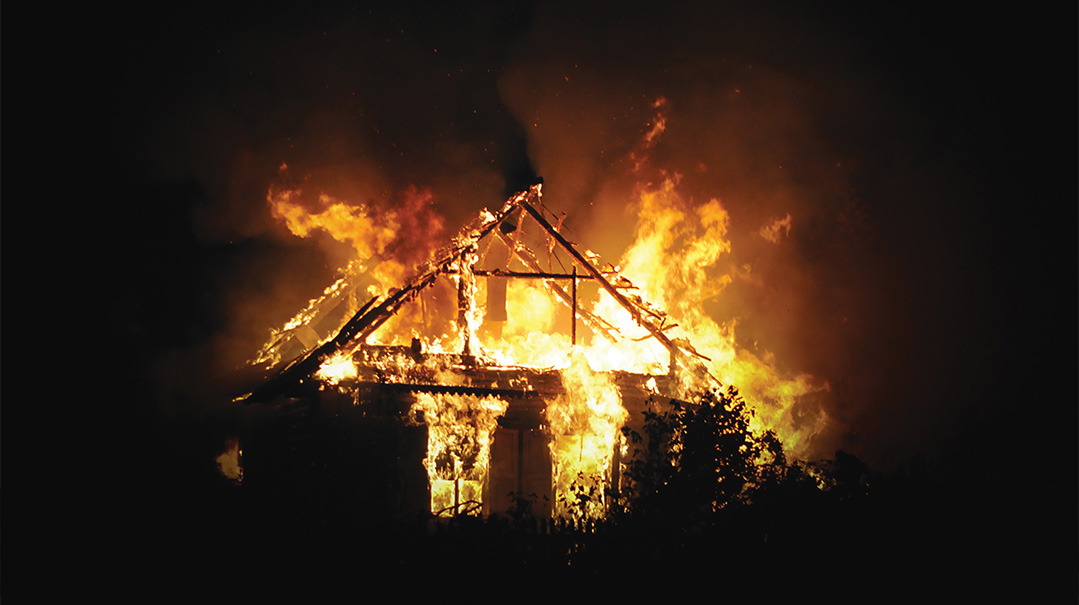From the Ashes
| March 14, 2023Could her family ever forgive her?

S
ruly Strick’s dreams are alive with fire. It crackles and burns around him until he can’t see anything but dancing orange. His lungs cry out in complaint as he breathes, the afterimage of the fire scorching the insides of his eyelids so he can’t escape even when he squeezes his eyes shut. The noise is so loud, like a thousand latkes frying on the stove around him, and he wants to scream.
This isn’t what happened. He had been in his bedroom with Mimi’s protective arms around him, window flung open so they could breathe. Ima had paced back and forth with Nachi as they waited for the firemen to come. There had been no fire in the room, just a hot doorknob and smoke wafting through the air, and Sruly had been afraid but also okay, because they’d all been together. Safe, with smoke rising around him.
He doesn’t feel safe in his dreams. He feels small. The fire is a monstrous dragon, whirling around him with glittering, poisonous scales. Mimi is behind the flames, her hands turning black and blistered as she reaches to him, and Nachi is calling him through the thunderous crackling. And Ima….
Ima’s hand lands on his arm, gentle and warm, soothing every spot where the fire touches. Sruly gulps — he can breathe now, can taste clear oxygen whooshing in — and Ima stands close, laying her head against his shoulder, until Sruly’s eyes open at last.
He isn’t in their old house. He’s in the Reichs’ carriage house, where they’ve been living for the past three months. There is no fire here. There is only Ima, sitting on his bed with her hand on his arm. Sruly sits up and burrows into her arms, willing away the horrible dream.
Ima runs a hand through his hair, her eyes warm and sad. She doesn’t speak. She can’t speak, Sruly knows. During the fire, Ima had been the one to get them all to his room with the big window, to call for help and save them, but she’d gotten hurt in the process. Fire, duh, Mimi says, because she thinks being ten means she knows everything. It burned her vocal cords.
Every day, Sruly remembers a little less how Ima used to sound. It’s a little like forgetting Abba’s face, but there are pictures for that, and Abba had already been sick in Sruly’s earliest memories of him. Ima’s voice had been ever-present in Sruly’s life, a companion through his daily life. The bus will be here any minute! Your rebbi says you’re top of the class in teitching. Your room is a mess. I made your favorite dinner. It sounds different when he looks at old videos on Ima’s phone, more strident, sharper. Sruly thinks Ima’s voice had been sweet. A little deeper than Mimi’s, but with a kind of smoothness to it, like the words just rolled off her tongue.
Ima talks in other ways now. She kisses Sruly’s forehead and then gets up, and Sruly hears her shuffling through the little carriage house kitchen, her bare feet padding across linoleum. The stove clicks on, and Sruly tenses, even though the stove has nothing to do with the fire, it had been a clogged dryer vent — the firemen had said so. But only when it turns off a few minutes later can Sruly relax.
Then Ima is back, a mug in hand. The cocoa is warm but not hot, the scent wafting through the room and erasing the dream-induced acrid fire that lingers in Sruly’s nostrils. He washes negel vasser — the basin always by his bed now like an insurance against a potential fire — and he sips his cocoa, letting it warm his body like his mother’s voice once did.
Ima sits with him until the sky lightens in the window and Nachi’s alarm for minyan is going off, shattering the silence between them.
Oops! We could not locate your form.







